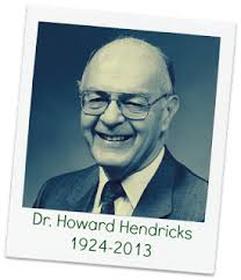|
In his tremendously helpful book, Teaching to Change Lives: Seven Proven Ways to Make Your Teaching Come Alive, the late Howard Hendricks reminds us that the best teachers remain passionately committed to learning themselves. The best teachers always remain students themselves. Listen to how Hendricks puts it (Teaching to change lives, pp. 17-18): The effective teacher always teaches from the overflow of a full life. I'm confident that Hendricks would agree that "growth" and "improvement" here as a teacher isn't only a cognitive growth. It's not only getting more and more head knowledge of the subject you're teaching - though I'm sure that's included. I think he'd agree that "growth" and "improvement" also include learning what to VALUE and how to VALUE it. It includes growing in PASSION for our subject matter. And it includes the lifelong process of increasingly APPLYING those things we teach.
So teachers: Are you learning?
0 Comments
Be forewarned that this post will be a little longer and somewhat more technical than many of my usual posts. I wanted to start to articulate my thinking on this subject, though (even though I'm late to the party), so here goes! :-) Happy reading! If you ever get overwhelmed by the length of this post or its content, click here for a light-hearted, humorous take on the Trinity! Depending on who you follow on social media and/or how attuned you are to theological news, you may be aware that in the last 6 weeks or so there's been a flurry of talk related to the Christian doctrine of the Trinity. (For a fuller review and summary - complete with who's involved and contributing, and a bunch of links so you can track the conversation - check out the summaries provided here and here over at The Cripplegate.) This "theological flurry" caught my attention as an evangelical Christian, because I worship God as triune and am therefore interested in discussion and theological refinement that may impact my worship (including renewed thinking, expression, and obedience). After all, thinking about and working to understand (what we can of) the Trinity is important! This "flurry" caught my attention as a pastor, because I'm confident there are some in Brookside's congregation that are aware of what's going on. Part of shepherding a flock includes theological care, and this discussion about the Trinity certainly falls within that category. And this "theological flurry" caught my attention as an adjunct professor at Grace University - where one of the classes I've taught is titled "Trinitarianism." (I've definitely got a lot more material for the next class when I include this recent debate!) The core of the back-'n-forth is around the issue of relationship between the persons of the Trinity. More specifically, the question seems to center around the intra-Trinitarian relationship between Father and Son. Most specifically, the debate rages over whether there is any sense in which the Son is functionally subordinate to the Father in His role. This subordination (or submission) applies not only to the incarnate Son while He's on earth, but is an eternal functional subordination (EFS), sometimes stated as a relationship of eternal relational authority-submission (ERAS). It must be noted that all sides agree that the persons of the Godhead share the same divine nature or essence. All are equally God. There is no subordination of nature, such that God the Father is "really God" and that the Son is "kinda God." (This is consistent with the 4th century articulation of Christian orthodoxy against the Arian heresy.) Again, this time with emphasis: Everyone has agreed that all persons of the Godhead are equally God. The Christian doctrine of the Trinity, however, maintains not only that all persons (Father, Son, and Holy Spirit) equally share the divine nature; it also maintains that there is a distinction in persons. The Father is not the Son, nor is the Son equated with the Father. In the same way, neither the Father nor the Son are the Holy Spirit. Equal in divine essence, distinct in personhood. This is the mystery of the Trinity, often illustrated with the graphic below. How we are to understand this "distinction of persons" is where there has been substantial disagreement.
As an integral part of their approach to Christian education, I'm hearing of a number of churches talk about something called "content strategy." (If you're in education, you're probably also very familiar with this word.)
Very simply (and straightforwardly), this emphasis on "content strategy" focuses on being strategic with their content. Oftentimes, this plays out in being intentional with WHAT content is created and/or recommended (keeping in mind who it's designed for, and the goals desired), and HOW the content is distributed/presented/made accessible. I happen to be a fan of being strategic with content myself, so I figured I'd chime in and provide three brief reasons WHY (in my opinion) content strategy should be on the radar screen of churches who think intentionally about Christian education. 6 Books that Can Help You Respond to the Uncomfortable - But Unavoidable - Reality of Suffering7/12/2016 D.A. Carson begins his book How Long, O Lord? Reflections on Suffering and Evil with these words: One of the major causes of devastating grief and confusion among Christians is that our expectations are false. We do not give the subject of evil and suffering the thought it deserves until we ourselves are confronted with tragedy. If by that point our beliefs - not well thought out but deeply ingrained - are largely out of step with the God who has disclosed himself in the Bible and supremely in Jesus, then the pain from the personal tragedy may be multiplied many times over as we begin to question the very foundations of our faith" (p. 11). In other words, there is tremendous value in thinking about suffering and evil even when our lives aren't directly touched at the current moment by these things. But let's be honest: For most of us, thinking about suffering and evil isn't an abstract thought-exercise. Thinking about suffering and evil brings real feelings to the surface, it revisits personal tragedy we've experienced or are experiencing, and it brings sin and the brokenness of our world to the center of our attention.
For all of these reasons, then, reflecting on a distinctly Christian perspective of suffering and evil is vital. Whether suffering "feels" distant or near, there's value in both embedding ourselves in Christian truth and surrounding ourselves with voices who can relate and speak to our struggles. As D.A . Carson goes on to say, "The truth of the matter is that all we have to do is live long enough, and we will suffer" (p. 16). Certainly, the Bible should always take pride of place in providing perspective and coming alongside of us as we experience pain and suffering. Books like Job and Lamentations can be precious here. And learning that Jesus relates to our pain and suffering - that He himself experienced injustice, loss, tragedy, grief, and more - teaches us that Jesus is our ally and a shoulder to lean on as we endure and address our own suffering. Other Christian books can also play a role here - at articulating biblical truth in a helpful way, and sharing personal experiences of suffering, grief, and pain. With this last comment in mind, then, below are six books that I suggest to those who are looking for resources to help them reflect on a distinctly Christian perspective on and approach to the reality of pain, suffering, and evil. (One more quick, but really important, comment: Working through issues like suffering, pain, and evil should never be done with just you and a book - as helpful as books can be. Remember to also surround yourself with Christian community and consider the value of pastoral and/or professional counseling if appropriate.) All right, on with the book recommendations: Based on the number of "hits" each month, here are the top 5 posts here on the Brookside Institute blog for the last six months - January 2016 through June 2016.
Did you miss any of these? Click on any of these "Top Posts by Month from January-June 2016" to be taken to the post, and check 'em out! (It's not too late!) |
Tim WiebeChristian. Husband. Father. Pastor. Learner. Contributor. Reader. Categories
All
Archives
June 2024
|
© 2014-2024 | 11607 M Circle, Omaha NE, 68137 | www.thebrooksideinstitute.net







 RSS Feed
RSS Feed
